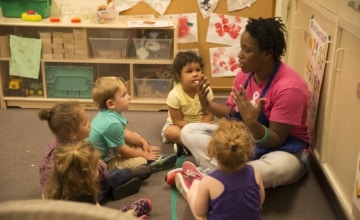This is a really fun time for parents, as 1-year-olds are able to explore the world in new ways and are eager to do things “all by myself!”

They watch their loved ones very carefully and copy a lot of what they see. This is one of the most important ways toddlers learn how the world works. How do you see your 12- to 15-month-old learning from watching you?
| What Your Toddler Can Do | What You Can Do |
|---|---|
| I’m moving! | Give your child just enough help to reach his goal. |
| I’m starting to talk and understand so much more. | Choose books about things that interest your child and make efforts to build his vocabulary. |
| I want to do more for myself. | Follow your child’s lead and involve her in self-help tasks. |
| I love to imitate. | Join in your child’s play. |
Spotlight on Temperament Between 12 and 15 Months
Every child is born with his own individual way of approaching the world—this is called his temperament. For example, some children are easygoing about changes. Others react very strongly to what seems like a small change, like new pajamas. Some children are very active. They love to move. Other children prefer to sit and watch the world around them. Some children enjoy new experiences and meeting new people. Others are slower to warm up in new situations. These are all examples of different temperaments.
There is no right or wrong, better or worse temperament. Temperament is not something your child chooses, and it is not something that you created. It’s very important for children to be accepted for who they are. Use what you know about your child’s temperament to encourage his strengths and to support him when needed. For example, if your child has a hard time with separations, you can guess that bedtime might be challenging. You can help your child by using the same bedtime routine each night (story, milk, tooth- brushing, and lullaby).
Your temperament matters, too. You might love to meet new people and try new things but your child doesn’t. Being aware of this difference is important. It helps you understand how your child’s needs may be different from yours. It also helps you learn what to do in order to support and respect your child for who she is.




